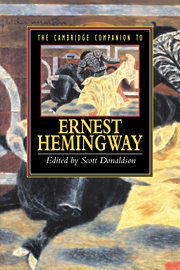Book contents
- Frontmatter
- 1 Introduction
- 2 Hemingway's journalism and the realist dilemma
- 3 1924
- 4 In Our Time, out of season
- 5 Brett and the other women in The Sun Also Rises
- 6 A Farewell to Arms
- 7 Hemingway's late fiction
- 8 Hemingway and politics
- 9 Hemingway and gender history
- 10 Hemingway, Hadley, and Paris
- 11 Hemingway's Spanish sensibility
- 12 The Cuban context of The Old Man and the Sea
- 13 Conclusion
- Selected Bibliography
- Index
- Series List
12 - The Cuban context of The Old Man and the Sea
Published online by Cambridge University Press: 28 May 2006
- Frontmatter
- 1 Introduction
- 2 Hemingway's journalism and the realist dilemma
- 3 1924
- 4 In Our Time, out of season
- 5 Brett and the other women in The Sun Also Rises
- 6 A Farewell to Arms
- 7 Hemingway's late fiction
- 8 Hemingway and politics
- 9 Hemingway and gender history
- 10 Hemingway, Hadley, and Paris
- 11 Hemingway's Spanish sensibility
- 12 The Cuban context of The Old Man and the Sea
- 13 Conclusion
- Selected Bibliography
- Index
- Series List
Summary
In preparing a line-by-line, word-by-word scholarly commentary on The Old Man and the Sea, I discovered many aspects of the narrative thus far overlooked. One pattern of neglected detail refers to workaday practicalities peculiar to the locale, and very often to local customs and habits of mind - to a general Cuban cultural consciousness. Here, as in many of his other works, Hemingway unobtrusively relies on such detail to account for his characters' motivation and to reveal what is actually being referred to in much of the dialogue. In other words, he requires his readers around the world to notice the specific cultural context of his narrative and to familiarize themselves with that context in order to follow what is literally happening in the plot.
This is an approach we accept as a matter of course in reading the works of other modernists - Joyce, Pound, or Eliot, for example. Yet it is a challenge posed so subtly by Hemingway's method that it has eluded us from the very beginning, in “Out of Season” (composed April 1923), his first narrative written in the style that was to make him famous. As I have pointed out (“Hemingway's Italian Waste Land“ esp. 79-89), readers can understand that troublesome story only by learning something about the attitudes of provincial Italian villagers living on the Austrian border after World War I. And our failure to recognize Hemingway's challenge to “think in the head” of his various other foreign characters has accounted for many a canonized misreading or marginal understanding of his works. We have tended to forget that Hemingway is at bottom a travel writer, performing the traditional novelist's function of helping us measure ourselves by and against precisely described exotics.
- Type
- Chapter
- Information
- The Cambridge Companion to Hemingway , pp. 243 - 268Publisher: Cambridge University PressPrint publication year: 1996
- 6
- Cited by



